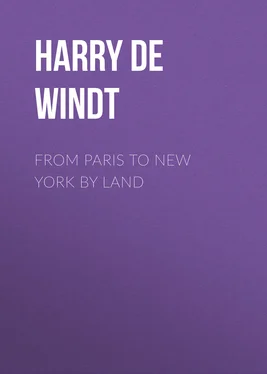Harry De Windt - From Paris to New York by Land
Здесь есть возможность читать онлайн «Harry De Windt - From Paris to New York by Land» — ознакомительный отрывок электронной книги совершенно бесплатно, а после прочтения отрывка купить полную версию. В некоторых случаях можно слушать аудио, скачать через торрент в формате fb2 и присутствует краткое содержание. Жанр: foreign_prose, foreign_antique, на английском языке. Описание произведения, (предисловие) а так же отзывы посетителей доступны на портале библиотеки ЛибКат.
- Название:From Paris to New York by Land
- Автор:
- Жанр:
- Год:неизвестен
- ISBN:нет данных
- Рейтинг книги:4 / 5. Голосов: 1
-
Избранное:Добавить в избранное
- Отзывы:
-
Ваша оценка:
- 80
- 1
- 2
- 3
- 4
- 5
From Paris to New York by Land: краткое содержание, описание и аннотация
Предлагаем к чтению аннотацию, описание, краткое содержание или предисловие (зависит от того, что написал сам автор книги «From Paris to New York by Land»). Если вы не нашли необходимую информацию о книге — напишите в комментариях, мы постараемся отыскать её.
From Paris to New York by Land — читать онлайн ознакомительный отрывок
Ниже представлен текст книги, разбитый по страницам. Система сохранения места последней прочитанной страницы, позволяет с удобством читать онлайн бесплатно книгу «From Paris to New York by Land», без необходимости каждый раз заново искать на чём Вы остановились. Поставьте закладку, и сможете в любой момент перейти на страницу, на которой закончили чтение.
Интервал:
Закладка:
"That man is an infernal scoundrel," said the Chief of Police, when told that Napoleon's barouche was to have cost me 150 roubles. "I will give you a couple of good Yakute sleighs for half the money. You can only use them on the Lena." And when I saw the primitive contrivances in question I no longer marvelled at their low price.
Let me describe the comfortless conveyance in which we accomplished the first two thousand miles of the journey across Siberia. A Yakute sleigh has a pair of runners, but otherwise totally differs from any other sleigh in the wide world. Imagine a sack of coarse matting about four feet deep suspended from a frame of rough wooden poles in a horizontal triangle, which also forms a seat for the driver. Into this bag the traveller first lowers his luggage, then his mattress, pillows, and furs, and finally enters himself, lying at full length upon his belongings. There is a thick felt apron which can be pulled completely over its occupant at night-time or in stormy weather. This sounds warm and comfortable, but is precisely the reverse, for after a few hours the porous felt becomes saturated with moisture (formed by bodily warmth and external cold), rendering the traveller's heavy garments damp and chilly for the remainder of the journey. There is nothing to prevent the Koshma , as this covering is called ( Cauchemar would be a better name!), from resting upon the face during sleep, and frost-bitten features are the natural result. So far, therefore, as comfort is concerned a Yakute sleigh is capable of some improvement, for, even in fine weather, the occupant must raise himself up on his elbows to see anything but the sky above him, while in storms the damp, heavy covering casts him into outer darkness. Under the most favourable circumstances little is seen of the country travelled through, but, as the Chief of Police consolingly remarked, "Between here and Yakutsk there is nothing to see!"
Provisions were the next consideration, and these were obtained from a well-appointed store on the "Bolshaya." We now had but a dozen cases of condensed foods, &c., left, and these I wished to keep intact, if possible, for use in the Arctic regions. On the Lena road the post-houses were only from thirty to forty miles apart, but as they only provide hot water and black bread for the use of travellers, I laid in a good supply of canned meats, sardines, and tea to carry us comfortably, at any rate, through the first stage of the journey. With months of desolation before us our English tobacco was too precious to smoke in civilisation, so a few hundred Russian cigarettes were added to the list.
At last came the welcome news that the Governor-General would grant us an interview. Accompanied by an aide-de-camp , we drove to the Palace on the banks of the Angará, and were ushered into the presence of the Tsar's Viceroy, who governs a district about the size of Europe. General Panteleyéff was a middle-aged man, with white moustache, light blue eyes, and a spare athletic figure, displayed to advantage by a smart dark green uniform. The General is a personal friend of the Emperor, and the cross of St. Andrew and a tunic covered with various orders bore witness to their wearer's distinguished career. He received me most cordially, and asked many questions regarding the land-journey, which had apparently aroused considerable interest in Russian official circles. The General, however, had no great faith in the proposed line to connect his country with the New World.
"We have our hands too full in the Far East for the next century," he said, with a smile, "to meddle with Arctic railways."
His Excellency assured me of every assistance as far as Nijni-Kolymsk, the most remote Cossack outpost on the shores of the Polar Sea, on ordinary occasions a year's journey from St. Petersburg. "Beyond Kolymsk," he added, "I fear I cannot help you. The Tchuktchi region is nominally under my control, but even our own officials rarely venture for any distance into that desolate country. But you will first have to reach Nijni-Kolymsk, and even that is a voyage that few Russians would care to undertake; and beyond Nijni-Kolymsk you will have yet another two thousand miles to Bering Straits. Great Heavens! what a terrible journey! But you English are a wonderful people!" Here a secretary entered the apartment with a document, which the Governor rapidly scanned and then signed.
"Your Imperial passport," he said, placing the paper in my hand, "which will ensure civility and assistance from all officials you may meet as far as the Kolyma river. Beyond that you must rely upon yourselves and the goodwill of the natives, if you ever find them! May God preserve you all."
So saying, with a hearty shake of the hand, the General touched a bell, the aide-de-camp appeared, and I was re-conducted to my sleigh, rejoicing that nothing could now retard our departure. Amongst other privileges the passport ensured immediate relays of horses at the post-stations. As there are no less than one hundred and twenty-two of these (from fifteen to twenty-five miles apart) between Irkutsk and Yakutsk, and as the ordinary traveller is invariably delayed by extortionate postmasters, this clause was of the utmost importance. In many other ways also the document was a priceless one, and without it we could scarcely have reached the shores of America.
It may be that I have unduly underrated the attractions of Irkutsk to the average public. If so, the reader must remember that every hour of delay here was of importance and meant endless worry and vexation to the leader of an expedition which had not an hour to lose. There is no doubt that Irkutsk must in a few years become a teeming centre of commercial activity. The social aspects of the place will then no doubt improve under the higher civilisation introduced by a foreign element. The resources of this province are limitless, for the soil has up till now, minerally speaking, only been scratched by idle fingers. Further afield we hear of important discoveries of valuable minerals in Manchuria, while the output of gold in the Lena district has been trebled by modern machinery within the past four years. Coal has also been recently discovered within a short distance of Lake Baikal, and is already being exported in large quantities to the Pacific ports. Irkutsk has, no doubt, a great commercial future, but should I ever return there I shall, personally speaking, be quite satisfied to find a decent hotel. Such an establishment run on modern lines would certainly yield fabulous returns. At present the only available restaurant is that of the grimy and verminous Metropole, and even here the local millionaires cheerfully pay prices for atrocious food and worse wines which would open the eyes of a Ritz.
Perhaps the most pleasant memory which I retain of Irkutsk is a cheery little supper which was given in our honour by a Mr. Koenigswerther and his wife and brother on the eve of our departure. The travellers, who had only arrived that day, were visiting the city on business connected with the purchase of furs, and a chance word dropped in the purest French by Madame at the dinner-table linked our parties inseparably for the remainder of the evening; indeed, until the next day. Madame Koenigswerther, an attractive little Parisienne , seemed to cast a gleam of sunshine over the gloomy dining-room in which we had partaken of so many melancholy meals. The trip here from Paris had already imbued her with a passion for further exploration, and I verily believe that she would have accompanied the expedition to Yakutsk if not restrained by her less enthusiastic male companions. Bed on such an occasion was not to be thought of, so we visited the theatre and café chantants , ending the evening with a supper at the Metropole (previously ordered by the fur merchants) which proved that money, even in Irkutsk, will convert a culinary bungler into a very passable chef . Our departure for the North took place very early on the morning of January 19, and I have since heard that nothing would induce our merry little hostess to seek her couch until the tingle of our sleigh bells had died out on the frosty air.
Читать дальшеИнтервал:
Закладка:
Похожие книги на «From Paris to New York by Land»
Представляем Вашему вниманию похожие книги на «From Paris to New York by Land» списком для выбора. Мы отобрали схожую по названию и смыслу литературу в надежде предоставить читателям больше вариантов отыскать новые, интересные, ещё непрочитанные произведения.
Обсуждение, отзывы о книге «From Paris to New York by Land» и просто собственные мнения читателей. Оставьте ваши комментарии, напишите, что Вы думаете о произведении, его смысле или главных героях. Укажите что конкретно понравилось, а что нет, и почему Вы так считаете.












